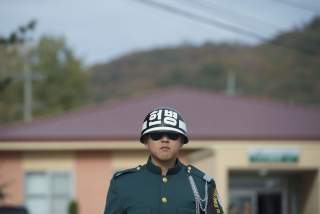North Korea Is a Total Nightmare—That South Korea Shouldn't Fear
By virtually every measure, Seoul has the upper hand over the North in a war.
The South has a similar qualitative edge in destroyers and frigates. The North lacks vessels of either type comparable in quality to the South’s Chungmugong Yi Sun-sin, King Gwanggaeto the Great, King Sejong the Great and Daegu class.
A similar quality gap exists in air power. The vast majority of North Korea’s interceptors and strike aircraft, save its MiG-29s, are Soviet vintage machines that date back to the 1960s, even the 1950s. South Korea’s American-made F-16 Cs, F-16Ds and FA-50s are in a different league altogether. And Seoul’s air superiority will increase further once its takes delivery, starting in 2018, of Lockheed-Martin’s F-35 multi-role stealth fighters. (It may buy sixty in all.)
The same pattern is apparent in the qualitative balance in tanks. The bulk of North Korea’s armor consists of Soviet T-55s and T-62s, which appeared in the 1950s and 1960s, or Chinese versions of the same. South Korea boasts far more sophisticated tanks, the K-2 Black Panther among them.
The point of the preceding comparison based on different elements of power (human capital, wealth, technology, and weaponry) is not that North Korea will soon fall apart or that it is militarily a paper tiger. Decline and collapse are distinct. The first need not lead to the second, and the transition may take a very long time even if it does. Despite their weaknesses, Pyongyang’s armed forces are formidable, and war on the Korean Peninsula will have horrific consequences, not least because Seoul contains at least a fifth of South Korea’s population and stands but thirty-five miles from the DMZ. Still, the standard claim that South Korea faces a massive threat from North Korea and cannot handle it without the twenty-eight thousand American troops that now supplement its strength is faulty.
The North would face a very tough fight, and its victory is hardly assured. Moreover, China, Pyongyang’s chief backer, does not want a war on its border; nor does Russia, its second most important supporter. For now, both China and Russia favor the status quo because they realize that the fallout produced by a North-South clash would soon reach them. Moreover, neither Beijing nor Moscow wants a unified Korea—a war might pave the way for that outcome—because they realize that it could align with the United States.
Beijing and Moscow will not support comprehensive sanctions against North Korea; they don’t want the regime to unravel. So there’s little chance of stepping up economic punishment to induce North Korea to scuttle its nuclear weapons. Besides, Pyongyang sees its nuclear arms as the ultimate guarantee against an attack, and won’t give them up to avoid economic pain. The studies on the efficacy of sanctions demonstrate they don’t convince states to change their behavior when doing so would imperil interests they deem vital. Yet while nuclear weapons will help Kim Jong-un avoid Saddam Hussein’s fate, their value is limited to deterrence—and maybe prestige, though that’s doubtful in North Korea’s case. That lesson has been learned by all nuclear-armed states. The North can rattle its nuclear saber in hopes of wringing concessions from the South, but it won’t succeed.
Sanctions that really bite could trigger an economic collapse in North Korea—if China participates. Pyongyang has undertaken reforms recently by expanding the role of the market in agriculture, providing more leeway to factory managers, substantially increasing the number of Special Economic Zones, and taking steps to boost tourism and foreign investment. Still, these steps may not boost economic growth enough to enable it to withstand sanctions that are tough and truly comprehensive.
But should South Koreans really want their northern neighbor to unravel? The process wouldn’t be peaceful. And if reunification were to follow it would be staggeringly expensive. Seoul would do well to consider West Germany’s experience after 1989. By 2010, western Germany had spent about $1.7 trillion to revamp and reintegrate the former German Democratic Republic (GDR). South Korea economic transformation over the past six decades has been remarkable. Its GDP in 1957 was equal to what Ghana’s was then. But South Korea is still much less wealthy than Germany, whose economic output is two-and-a-half times larger. And for all of its problems, the German Democratic Republic was economically far more advanced than North Korea.
Both South Korean and American experts exaggerate South Korea’s vulnerability. Given the North-South military balance, a war on the Korean peninsula remains unlikely. President Park’s political problems will not change that. Nor, contrary to the commonplace view, will Trump’s decision—whatever it may be—relating to U.S. troops in South Korea. Pyongyang’s leaders may be unpredictable, but they have never been reckless enough to risk their state’s survival. That’s precisely what they would do by attacking the South. South Korea has the wherewithal to defend itself, and the North, its bombast notwithstanding, likely understands that.
There are ways to make the Korean peninsula a safer place. For denuclearization to happen, South Korea and the West must discard their faith in sanctions. They should turn to a multilateral diplomatic strategy that includes China and Russia, and offers North Korea economic incentives as well as reassurances about its security in exchange for parting with its nuclear arms. Progress on the nuclear front should be followed by troop pullbacks and confidence-building measures along the DMZ. The chances of success are slim, but the effort should be made nevertheless.
Rajan Menon is Anne and Bernard Spitzer of International Relations at the Powell School, City College of New York/City University of New York. He is a senior research fellow in the Saltzman Institute of War and Peace Studies at Columbia University. He is the author, most recently, of The Conceit of Humanitarian Intervention (Oxford University Press, 2016).
Image: A Republic of Korea Army soldier guards the Korean Demilitarized Zone. Flickr/Ash Carter

